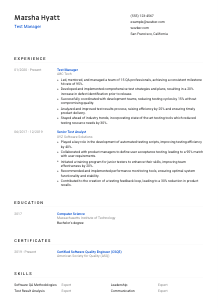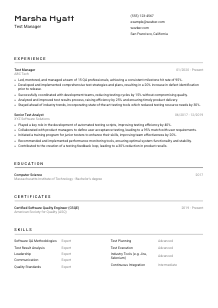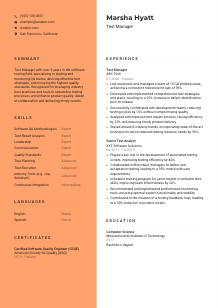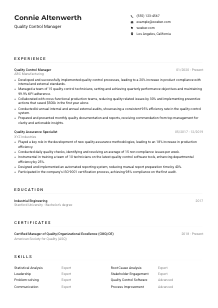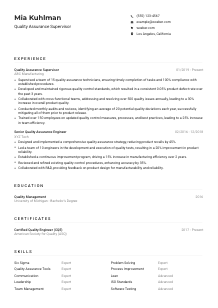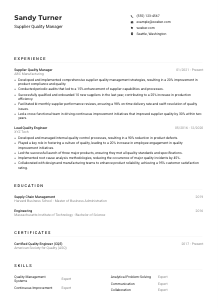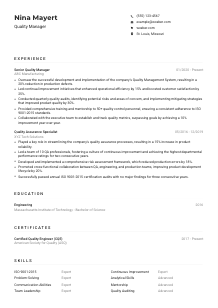Test Manager Resume Example
Mastering product quality but unsure about your resume outcome? Dig into this Test Manager resume example, crafted using Wozber free resume builder. Discover how seamlessly you can document your testing leadership, ensuring your career trajectory doesn't face any critical bugs!
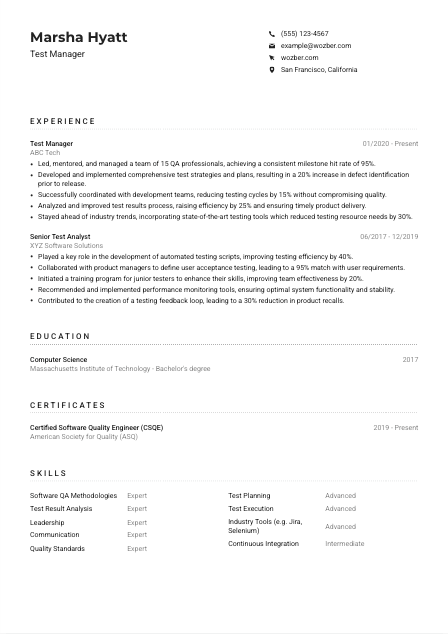
How to write a Test Manager resume?
Ah, the life of a Test Manager — a mix of strategy, leadership, and the unyielding pursuit of quality. If you're gearing up to step into this pivotal role, understand that your resume is more than a piece of paper; it's a missile aimed directly at your future employer's needs, designed to blast away any doubts about your suitability. With the right guidance and the magic of Wozber's free resume builder, you're about to create an ATS-compliant resume that not only ticks all the boxes but does so with flair and precision.
Let's dive in and transform your resume into a ticket to your next career adventure.
Personal Details
First impressions count, especially on your resume. The Personal Details section might seem straightforward, yet it's your first handshake with the employer. Let's ensure it's a firm one, resonating confidence and alignment with the Test Manager role you're eyeing.
1. Lead with Your Name
Think of your name as your personal brand's logo. It should be clear and bold. Opt for a readable font that's slightly larger than the rest of your text, ensuring it catches the eye instantly.
2. Job Title Precision
Right below your name, echo the role you're applying for. By directly stating "Test Manager", you align your identity with the job at hand, making it clear from the get-go what position you're targeting.
3. Critical Contact Info
Include your most accessible phone number and a professional email address. Aim for an email format that's simple and easy to remember, typically yourfirstname.lastname@email.com. Accuracy here is non-negotiable; double-check for typos.
4. Geographical Match
Given that the job specifies "San Francisco, California", make sure to include this in your contact details. It reassures the employer of your availability and proximity, eliminating any concerns about relocation.
5. Online Presence
If you have a LinkedIn profile or a personal website showcasing your professional portfolio, include it. Just ensure that your online presence is polished and mirrors the brilliance of your resume.
Takeaway
Think of the Personal Details section as laying down the red carpet for your professional narrative. It's the prelude to your capabilities and experiences. Paying attention to these details sets the professional tone for the rest of your resume, making it impossible to overlook.





Experience
The Experience section is where you bring out the big guns. It's not just about what you've done, but how what you've done aligns precisely with what's needed for a Test Manager. Reflect, refine, and articulate your experiences in a way that lights up the eyes of your future employer.
- Led, mentored, and managed a team of 15 QA professionals, achieving a consistent milestone hit rate of 95%.
- Developed and implemented comprehensive test strategies and plans, resulting in a 20% increase in defect identification prior to release.
- Successfully coordinated with development teams, reducing testing cycles by 15% without compromising quality.
- Analyzed and improved test results process, raising efficiency by 25% and ensuring timely product delivery.
- Stayed ahead of industry trends, incorporating state‑of‑the‑art testing tools which reduced testing resource needs by 30%.
- Played a key role in the development of automated testing scripts, improving testing efficiency by 40%.
- Collaborated with product managers to define user acceptance testing, leading to a 95% match with user requirements.
- Initiated a training program for junior testers to enhance their skills, improving team effectiveness by 20%.
- Recommended and implemented performance monitoring tools, ensuring optimal system functionality and stability.
- Contributed to the creation of a testing feedback loop, leading to a 30% reduction in product recalls.
1. Decoding Requirements
Firstly, take a magnifying glass to the job description. Highlight the phrases that resonate with your past roles, especially those involving leadership, strategy, and QA methodologies. This alignment is your golden ticket.
2. Relevant Roles First
List your experiences in reverse chronological order, focusing on roles most relevant to a Test Manager position. Each entry should include your job title, the company's name, and the tenure of your role.
3. Achievement Bullets
Under each role, draft bullet points that summarize your accomplishments. Use action verbs to start each bullet, and mirror the language from the job description to demonstrate direct relevance to the Test Manager role.
4. Quantifiable Impact
Numbers speak volumes. For example, "Developed and implemented comprehensive test strategies, resulting in a 20% increase in defect identification prior to release," showcases your ability to deliver measurable improvements.
5. Relevance Is Key
Keep your experiences streamlined and relevant. While extracurricular achievements are commendable, your resume should focus like a laser on what matters most for a Test Manager role.
Takeaway
Think like a hiring manager: what accomplishments and experiences would convince them you're the one? Your Experience section is your professional storyline, written so compellingly that it leaves them eager to meet you. You're not just listing tasks; you're showcasing your journey of impact.
Education
Your Education section does more than list degrees; it underscores your foundational knowledge and readiness for the Test Manager role. Let's align your educational background with the job's request for a 'Bachelor's degree in Computer Science, Information Systems, or a related discipline.'
1. Key Requirements
Highlight your degree that matches the job's educational requirements. If your degree is in Computer Science, as sought by the employer, place it front and center.
2. Structure Matters
Maintain clarity in your Education section. List the degree name, institution, and graduation year in a clean, easy-to-read format. This isn't the place for creativity in layout; clarity is king.
3. Degree Specifics
Ensure your degree title is accurate and mirrors the job requirement. For example, "Bachelor's degree in Computer Science" directly matches the employer's specified need.
4. Course Highlights
If you took courses particularly relevant to the Test Manager role or that gave you specific skills cited in the job description, mention these. However, keep it succinct; the degree itself is the star.
5. Supplementary Education
Include any honors, relevant extracurricular activities, or capstone projects but weigh the relevance against your level of experience. For senior positions, these details may serve more as interesting talking points than decisive factors.
Takeaway
Your education is a testament to your commitment and readiness for the challenges ahead. With the right emphasis, it reassures your prospective employer that you have the theoretical underpinning to accompany your practical experience. Let it shine.
Certificates
In the realm of Test Management, certifications can be the cherry on top of a well-constructed resume. They're your chance to highlight ongoing learning and specialization. Even if not explicitly asked for in the job description, the right certifications can set you apart.
1. Extract Relevance
Begin by identifying certifications that directly align with the desired role. In our example, a "Certified Software Quality Engineer (CSQE)" from the American Society for Quality (ASQ) showcases a dedicated commitment to quality in software testing.
2. Quality Over Quantity
List certifications that directly support your application for the Test Manager role. It's more impactful to have a few highly relevant certifications than a long list of only tangentially related ones.
3. Date Matters
Be clear about the acquisition or expiration dates of your certifications, especially if they're particularly relevant to the rapidly evolving field of software testing.
4. Continuous Learning
Highlight your commitment to staying current by listing recent certifications or by mentioning ongoing education. This eagerness to learn is highly valued in the technology field.
Takeaway
Your certificates are not just accolades; they're proof of your commitment to excellence and continuous improvement. Each one is a feather in your cap, showing that you go above and beyond the basics. Curate and present them as powerful indicators of your professional depth and breadth.
Skills
The Skills section of your resume is a compact showcase of the tools you bring to the Test Manager role. It's here that you tailor your professional toolkit to match the job's requirements, blending hard skills with the soft ones that underscore your leadership and communication prowess.
1. Dissect the Job Description
Sift through the job posting to extract both stated and implied skills required for the role. Keywords like "software QA methodologies," "test planning," and "leadership" are your cues.
2. Match and Map
Align your skills with those requested in the job description. For instance, if "excellent communication" and "leadership skills" are mentioned, ensure these are prominently featured in your Skills section.
3. Prioritize Clarity
Focus on listing skills that are most relevant to the Test Manager position you're applying for. A tidy, prioritized list is more impactful than a jumbled collection of every skill you possess.
Takeaway
Your Skills section is a powerful part of your resume, highlighting the professional toolkit you offer. Approach it as a curated gallery of your capabilities, making sure each skill listed is meaningful and relevant to the role at hand. Let your skills paint a picture of your unmatched suitability for the Test Manager position.
Languages
In today's interconnected world, the ability to communicate across cultures is invaluable. Even though a Test Manager role may not explicitly demand multilingual skills, showcasing your linguistic capabilities can differentiate you in a crowded field.
1. Language Prerequisites
Start by noting if the job listing specifies a need for particular language proficiencies. As cited in our example, "Must be adept at English language communication" is a requirement, so your fluency in English should be highlighted.
2. Primary Language First
List English prominently as your first language if you're fluent or native. This direct response to the job requirement places you squarely in the running.
3. Showcase Additional Languages
Following your primary language, list any additional languages you speak. This shows versatility and a readiness to engage in diverse work environments.
4. Honest Proficiency Levels
For each language, clearly specify your level of proficiency. Be honest; overstating your abilities can lead to awkward situations down the line.
5. Assess the Role's Scope
Consider the broader context of the Test Manager role. If it involves international teams or stakeholders, your multilingual skills become a significantly valuable asset.
Takeaway
Your ability to communicate in multiple languages is a testament to your versatility and adaptability. While it might not be the central requirement for a Test Manager role, it's a distinguishing factor that can set you apart from the competition. View each language as a key that can unlock new opportunities and connections.
Summary
Your resume's Summary section is your opening pitch. It's the lens through which a hiring manager first views you, so it needs to be compelling, concise, and reflective of your qualifications for the Test Manager role. Let's craft a summary that encapsulates your professional essence.
1. Capture the Essence
Begin with a punchy introduction that encapsulates your professional identity and your tenure in the field. For example, "Test Manager with over 6 years in the software testing field" immediately frames you as an experienced professional.
2. Address Core Requirements
Highlight your mastery of key skills and accomplishments. Draw directly from your experiences that best align with the job description, such as your ability to "lead and mentor QA teams" and your knack for "devising effective test strategies".
3. Conciseness Is Power
Your summary should be a potent brew of your highest achievements and skills, condensed into 3-5 punchy lines. Think of it as your personal ad—it needs to grab attention and hold it.
4. Tailor with Precision
The summary should echo the language of the job description, subtly mirroring the requirements and responsibilities. This alignment makes it clear you're not only a fit—you're the perfect fit.
Takeaway
An effective summary is your chance to shine right from the start, promising the hiring manager that there's much more value you bring to the table. By tailoring it judiciously, you set the tone for a resume that reads like a direct response to their needs. Infuse it with your personality and professional pride, and watch as doors open for your next great opportunity.
Embarking on Your Test Manager Journey
Congratulations on meticulously crafting every section of your Test Manager resume with Wozber's free resume builder! This journey, while rigorous, primes you for success in the competitive field of software testing and quality assurance. Your resume is now not just ATS-compliant but is a vibrant narrative of your expertise, tailor-made for your dream role. As you prepare to submit your application, remember: your resume is a testament to your professional journey, technical acumen, and leadership potential.
Let it be your ambassador, boldly asserting your readiness to take on the challenges of a Test Manager role. Forge ahead with confidence—the next chapter of your career awaits.

- Bachelor's degree in Computer Science, Information Systems, or a related discipline.
- Minimum of 5 years of experience in software testing, with at least 2 years in a managerial or lead role.
- Strong knowledge of software QA methodologies, tools, and processes.
- Proven experience in test planning, test execution, and test result analysis.
- Excellent communication and leadership skills with the ability to mentor and coach team members.
- Must be adept at English language communication.
- Must be located in San Francisco, California.
- Lead, mentor, and manage the QA team to ensure the highest quality standards for all software products.
- Plan, develop, and implement test strategies, test plans, and test cases based on requirements and system specifications.
- Coordinate with development teams to prioritize testing efforts and ensure timely delivery of high-quality products.
- Analyze test results, identify areas of improvement, and recommend corrective action to stakeholders.
- Stay updated with the latest industry trends, tools, and best practices to continuously enhance the testing process.





